A decade of excellence: The Skating School's journey
Part II. Christopher Trevisan: "It's about making it work"
April 9, 2025
By Reut Golinsky
Photo © Reut Golinsky
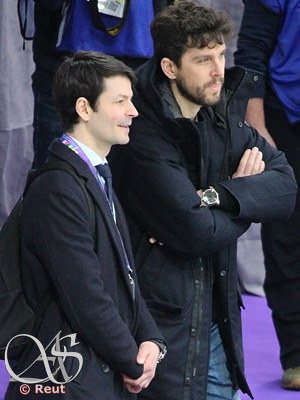 For the Skating School of Switzerland to run like a Swiss clock - excuse the predictable analogy - a great deal of work goes on behind the scenes. Accounting, resource planning, ice time, training schedules, and staff development all fall under the responsibilities of Christopher Trevisan, the school's director and a man of many roles. He shared with us how it all began and where it's headed.
For the Skating School of Switzerland to run like a Swiss clock - excuse the predictable analogy - a great deal of work goes on behind the scenes. Accounting, resource planning, ice time, training schedules, and staff development all fall under the responsibilities of Christopher Trevisan, the school's director and a man of many roles. He shared with us how it all began and where it's headed.
When I was in Champéry last time, I noticed a banner at the ice rink that said, "Respect. Friendship. Excellence." And even though I don't think your school made it, I thought it was so fitting.
As far as I remember, this banner was made by the Swiss Olympic program, and those are the three words they associate with. At our school, we have our own values, which are clearly defined - they're printed in my office. They are: authenticity, challenge, creativity, pleasure, and respect. The order is alphabetical. I don't think we necessarily emphasise one over the others; these are simply the values that we, as a community of coaches and skaters, collectively agreed upon. They define what's important to us in our work together.
This was the result of a workshop - we had some discussions, and each person also reflected on their own personal values, which might have been somewhat different but never opposed. And I'd say it was actually pretty easy to get there. And then there are some nuances in certain words, right? For instance, "challenge" or "encouragement" - little details like that.
I already heard two versions of how the school was created - one from Stéphane and one from Robert, with whom we once had a very long interview. What's your version?
I think the story is more or less known - we explained it when we first started this project. I remember it really well because the first discussion happened on my birthday. It was the summer of 2013, two years before the camp was due to start, as the first camp was planned for July-August 2015. We were celebrating in Zermatt, and Robert and Anna were there with some other friends. We were in this beautiful place, and somehow we ended up discussing summer camps - maybe because Stéphane and Anna used to train in Oberstdorf during summer camps.
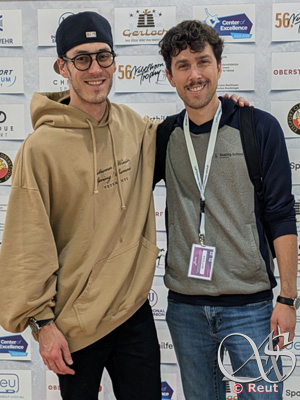 So we asked ourselves: what would be the perfect summer camp? What would be the perfect training experience for an athlete growing up with competitive ambition? We talked about their experiences, the different places they had trained, and the different people they had trained with. And eventually, we thought: let's work on something! Let's start a project together, do a two-week camp, and try to make it as good as we possibly can - to make it perfect.
So we asked ourselves: what would be the perfect summer camp? What would be the perfect training experience for an athlete growing up with competitive ambition? We talked about their experiences, the different places they had trained, and the different people they had trained with. And eventually, we thought: let's work on something! Let's start a project together, do a two-week camp, and try to make it as good as we possibly can - to make it perfect.
That's how it all started. We worked a lot on it during the autumn, and it was announced really far in advance because we wanted to give ourselves enough time to do it properly. If I remember correctly, Anna and Robert were still studying at the time. I was also studying and writing my PhD thesis. And Stéphane was touring a lot.
And how and when did a two-week camp suddenly turn into a year-round school?
In February 2014, the Olympics took place in Sochi, and for the first time in decades, there wasn't a single Swiss skater at the Games. Switzerland was just coming out of the era of Stéphane and Sarah Meier - we had been at the top for almost a decade. There was a sense that not much had been built on their success. Stéphane felt he should do something, to contribute, to help.
The analysis we made was that Swiss skaters were just like he had been in his time. He had trained in multiple places because there wasn't one location where he could find everything. He trained in Villars and Geneva, did his off-ice training in Lausanne, and in the summer, he went to Oberstdorf.
The idea was that we needed one place where all these competencies came together. A place where, if you were aiming to be a competitive skater, you could find everything you needed. At the time, Stéphane had also been choreographing for a couple of years, working with several skaters like Miki Ando and Denis Ten in Champéry. Back then, we would just book some private ice in May, June, and July. And we always had such a good time!
It's always difficult to talk about Denis Ten... I have so many memories of truly wonderful times in Champéry. We rented apartments here and there, cooked together, 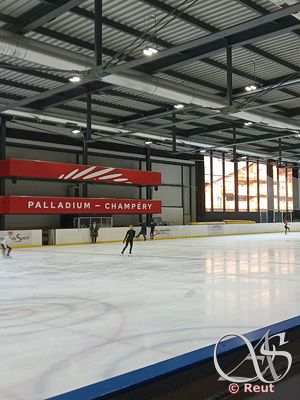 had barbecues in the evenings - it was just wonderful. The experience was so nice, and we saw that the ice rink was there, with all the necessary facilities - not just the rink itself, but also a pool, spaces for specific off-ice training, and other activities available in the village. And the rink was really, really underutilized. It was available. And it's difficult to find an ice rink that isn't extremely busy, right?
had barbecues in the evenings - it was just wonderful. The experience was so nice, and we saw that the ice rink was there, with all the necessary facilities - not just the rink itself, but also a pool, spaces for specific off-ice training, and other activities available in the village. And the rink was really, really underutilized. It was available. And it's difficult to find an ice rink that isn't extremely busy, right?
And that you weren't taking someone's place, you were creating from zero...
Exactly. But on the other hand, starting from zero is very, very hard. And that's one of the most emotional things for us, looking back after these ten years - remembering what we started from, which was literally nothing. We started from scratch. No students, no coaches. Nothing.
So, back to my question: the plan was to have a camp in 2015. When did it suddenly start becoming 2014?
Yes, so in February 2014, following the Olympics, we had this realization. Stéphane was also touring with "Art on Ice," and both Robert and Anna were touring with them [as ensemble skaters]. So we had the chance to talk a little more, and I just thought: "You know, maybe now is the time?"
Stéphane was already working with Noah and Noémie (Bodenstein) in Lausanne, and it was clear they would benefit from a more professional structure. So there was also an immediate need, it was a conjunction of many factors. We were already talking with Anna and Robert about the camp, and we had a very good connection. We felt they were the right people to start this thing together. And then things moved quickly - we started discussions in mid-February, and by the 17th of August 2014, we already held an open day.
So we didn't have much time, you know. We needed to start serious discussions with the ice rink to secure reliable ice times. And we needed to start communicating that we existed - because you have to have students; otherwise, coaches don't have anyone to work with. So we did this opening day on the 17th of August, and from there, it just kept going. And, of course, we still had the 2015 camp as a major objective. And that became the model for what we were trying to achieve - continuously, throughout the year.
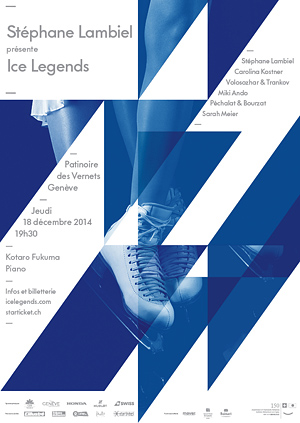 All this while also working on "Ice Legends"!
All this while also working on "Ice Legends"!
Yes, which took place in December 2014. Yeah... it was a big, really big year.
But you know, we were young, we had a lot of energy, and we were motivated to do something to help skaters who needed it. Very, very motivated - taking on multiple projects at once. "Ice Legends" was a huge project, and we were self-financing it. So, as you can imagine, we were also taking a huge financial risk putting it together. We had to find sponsors, sell tickets, and communicate. We had to organise the artists, make sure we could get the ice. And then, at the same time, we were starting the Skating School - and, like I mentioned, I was still writing my thesis...
If you mention your thesis again, I have a memory to share. At Europeans in Minsk, Stéphane had to leave one of Deniss' practices early, so you stayed at the boards for him. I was there as a journalist, and I remember thinking at that moment: here we are - I with my MSc in computer science, you with your PhD in economics - and we're both working at a figure skating competition. How bizarre is that!
Yes, I think it's important to reflect on that because, obviously, this was not the career path I was set on. Or that I had set for myself. At that time, I already had some experience in the financial sector, and that was clearly where I was headed.
On the other hand, I also had some experience as an entrepreneur - I'd created a company with a couple of friends - so I had this experience of coming up with a project, making a business plan. What I found exciting was not so much the topic itself, but the process: coming up with an idea, working on it, refining it, making it a reality, tackling issues and finding solutions. So initially, I came in with some experience and competencies in business management and entrepreneurship, and then working with the athletes - that was something I found truly fascinating. The technical aspect of skating is not my job, and I don't weigh in on that at all. But observing these athletes, trying to analyse what they need, seeing what I can provide, and how we can organise training in a way that is most beneficial for them - that's what I find really fascinating.
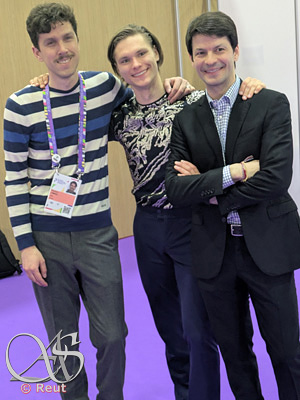 So when I completed my thesis, I had to make a decision: do I follow the track I was on or... At that time, I was already serving as interim director of the school, and I thought: "This is actually what I enjoy doing!" So I took it on full time.
So when I completed my thesis, I had to make a decision: do I follow the track I was on or... At that time, I was already serving as interim director of the school, and I thought: "This is actually what I enjoy doing!" So I took it on full time.
I graduated in 2016, so it's already been over eight years. And I've never regretted it! It's such a varied job. I handle a lot of administrative tasks - accounting, resource planning, ice time, training schedules, and so on. It's also a management role - I talk to the people who work with us, see what kind of career development they want, and figure out how we can support that. And then, I also get to come to competitions, watch all the beautiful skating, and support Deniss - not just in training but also in getting shows, sponsors, and so on. So my job is incredibly diverse, and I'm never bored. Sometimes it's way too much work for my sanity, but it's always fun.
Did you imagine ten years ago that the school would become what it is today? A Center of Excellence, hosting camps for skaters and coaches from all over the world. Champéry is the place to come now. I mean, just think how much money you bring to Champéry's tourism!
(laughs) For sure. I definitely believe the school is a huge asset for the village. We also have the advantage of being an activity that runs almost year-round. The school is open forty-nine and a half weeks a year. We take two and a half weeks off when everyone else is on holiday so we can recover a little. But aside from that, when it's spring and no one is coming for skiing or hiking, we're here, and we have skaters who want to come, stay in accommodations, eat in restaurants. And it's been heartwarming to see how much people have come to appreciate Champéry, right?
I remember when Stéphane first mentioned Champéry to me - during Denis Ten's show in the summer of 2014 - I asked him how to spell it. I had no idea where it was. And now it's one of my favourite places to visit.
Yes, now I think the name is definitely well known.
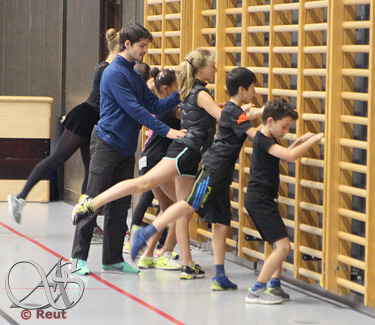 But could you have imagined all this ten years ago?
But could you have imagined all this ten years ago?
Honestly, we just wanted to be the best place we could be. But it also had to stay true to our values, which brings us back to the topic we started with. The Skating School is a reflection of the values we hold. And of course, some people will connect with those values more than others, right? The thing you didn't see on that list was "winning" - it's not one of our values. "Challenge" and "creativity" are. We were never focused on winning everything, that was never the goal. But we always want to challenge ourselves, to be the best version of ourselves.
That motivation was there from the very beginning. Where could it take us...? The concept of the Centers of Excellence didn't even exist back then, it started in 2019. But when we were chosen for the pilot phase, it was an honour.
How did you get involved in this project, by the way? I thought you volunteered.
When the proposal for this pilot phase came out, we thought: "That's exactly what we're trying to do!" And it's still in development. I don't feel like we've reached a point where we can say: "That's it, we've done a good job, and we're going to keep doing the same for the next ten years." We just want to improve. Last year, for example, we did more things, like the ISU Development project at the end of June, and we're working on that for this year as well, extending it to some other centers. The summer camps have evolved a lot; they're much more developed and refined than when they started. Every year, we aim to make the camp a little bit better than it was the year before, learning from the experience. And I think, as long as we maintain this mindset, I'll be happy - it'll be fine.
I can't say we were aiming to be a Center of Excellence; we just wanted to be the best training center we could be. And this will always be a work in progress.
If I were to ask you where you see your school in ten years?
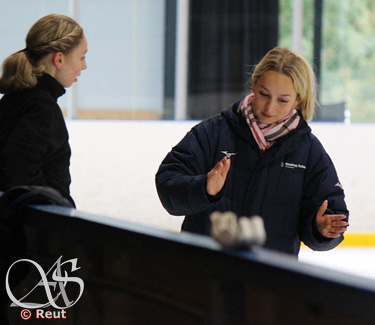 (smiles) I don't know. But there are still many things we want to work on. One of the things we feel is very important and want to do more of is coaching the coaches, training the next generation of coaches. In a sense, you can already see that a little bit with Gerli (Liinamäe).
(smiles) I don't know. But there are still many things we want to work on. One of the things we feel is very important and want to do more of is coaching the coaches, training the next generation of coaches. In a sense, you can already see that a little bit with Gerli (Liinamäe).
We did this a bit with the ISU development project in June when skaters came with their coaches. That was a really nice experience, and we want to build on that. We also want to do more for the coaches. And, you know, for us too, we always need good coaches - good coaches are really hard to come by. It's essential to find people who are competent, obviously, but also share your values. That's what I mean when I say it's not easy to find good people. Not good people in an absolute sense, but the right people for you, for your center, and for the values you hold. Please don't misunderstand me - there's plenty of competence out there, but we need people who want to work the way we've established at the school. This grew organically; we didn't start with a master plan of "this is how we're going to work." We started doing things a certain way and learned little by little.
It's all refined now. Sometimes we think: "How did we manage before the pandemic?" Because the pandemic forced us to adopt a much more structured, systematic approach. We had to keep track of who was where, had some capacity limits, and needed to plan things in a much more precise way. We found that was actually quite helpful. We learned from it, and now it's just part of the routine.
As soon as you have a certain number of athletes and a certain number of staff, it's not so trivial anymore. It's much easier when you're one coach with six, seven, or eight students. But when you need to work in a group - and that was our intention from the start; we work as a team, we complement each other - it requires a lot of communication and organisation.
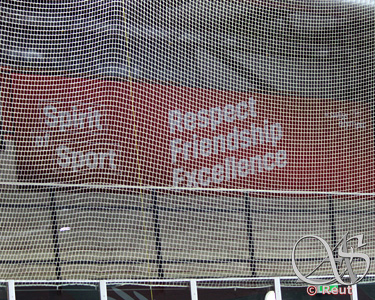 So we needed something like a management app. Nothing like that existed, and we've been paying hundreds of francs for a system that has all sorts of limitations. Initially, it wasn't too bad, but we quickly outgrew it and ran into tons of technical issues. So we felt it was time to do something on our own. I looked around, and if I had to commission it from a company, it would have cost tens of thousands. So with the help of the Python web framework, Django, I wrote an app myself. We have our calendar there, coaches' planning, and a registration system - a basic system that I've designed to fit our needs exactly.
So we needed something like a management app. Nothing like that existed, and we've been paying hundreds of francs for a system that has all sorts of limitations. Initially, it wasn't too bad, but we quickly outgrew it and ran into tons of technical issues. So we felt it was time to do something on our own. I looked around, and if I had to commission it from a company, it would have cost tens of thousands. So with the help of the Python web framework, Django, I wrote an app myself. We have our calendar there, coaches' planning, and a registration system - a basic system that I've designed to fit our needs exactly.
With the resources we have, we just want to do the best job possible. So with this system, I'm hoping to make our operations more efficient, less time-consuming, to help coaches get the right information, and to let skaters and their parents access parts of the platform as well.
I saw that at the end of the session, coaches usually write down summaries in some kind of journal? Will this system replace that?
We call it a "logging sheet," where we simply log the lessons. This is mainly for general invoicing and staff payments. So we need to know: who did you work with? For how long? What kind of lesson was it? They do this by hand because we realised that's the easiest way - it only takes a few seconds. But this is also something I'm working on in the new platform to make it more efficient. And ultimately, maybe, I can come up with something that's sufficiently ergonomic for the coaches. We were thinking about having an app for a smartwatch, for example.
Right now, these are just ideas. At the end of the day, my "time budget" is very limited, so I have to make the most of it. That's how I approach things. It's not about polishing it; it's about making it work and having the right functionalities.
If we mention how much your school has grown, can you give me some statistics?
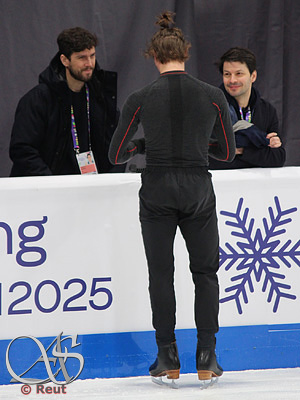 We had about two hundred unique skaters training with us over the previous season, from May 2023 to April 2024 - two hundred skaters representing 22 different ISU members.
We had about two hundred unique skaters training with us over the previous season, from May 2023 to April 2024 - two hundred skaters representing 22 different ISU members.
And that number doesn't include all the "learn to skate" kids, right?
That doesn't include all the beginners or the school programs. Because now we also teach local kids from the schools of Troistorrents, Val-d'Illiez, and Champéry. So we have about 500 kids who come to skate two to four times during the school year.
This is something new we started. Initially, we did it to help out another coach who had been running the program for several years. We certainly didn't want to take their business, but a couple of times they were unavailable, and the rink asked us whether we could step in. So we said: "Let's do it." And even Stéphane gave some of the classes, and he loved it so much. So when the coach was no longer available, we took it on ourselves. We had to give classes on Monday, which, you know, is normally our free day. But we felt we had to help, and it's also our way of giving back to the community that supports us. We felt it was important.
School kids have a one-hour class two to four times in autumn or sometimes at the beginning of winter, it depends. For example, kids from Champéry have four one-hour lessons each school year until they're around twelve. So now we're responsible for the entire skating program for these kids. We were able to establish a partnership with the schools in these villages to provide this service. And we're hoping to get more people interested in skating - not necessarily as competitors, but at least to see how much fun they can have on the ice. Hopefully, they'll also start coming to public sessions on their own. And if a few of them decide to join the beginners' classes and eventually become students at the school, then great. But for us, it's really about getting people excited about skating.
And maybe also changing the mindset that existed in Switzerland, when skating wasn't seen as a serious professional activity: 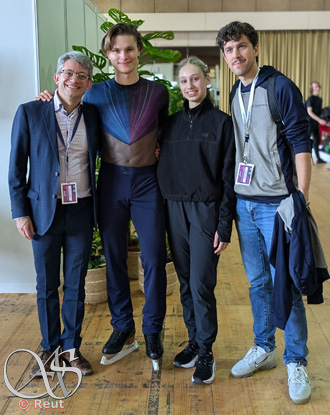 "Everybody skis, everybody skates, but when it comes to a profession, what do you want to be?"
"Everybody skis, everybody skates, but when it comes to a profession, what do you want to be?"
I feel that mindset definitely existed when Stéphane competed. There's still some of that in Switzerland, but to be honest, I think it has improved. More schools and universities have started to accommodate the needs of young athletes, and remote learning has become more common. But society as a whole takes time to change and to recognise sport as a legitimate profession, as something that can lead to a real career.
As an employer, I've always been so impressed by athletes - not just by their skills, but by the qualities they develop through sport: dedication, resilience, the ability to make a plan, set objectives, and measure progress against performance. These are qualities that are incredibly useful in any professional context. Even if they don't stay in their specific sport, these qualities they gain from their investment in it carry over to any career. And to me, as an employer, they are extremely valuable. If you do it the right way - if you're committed and take it seriously - it's a great investment in your professional future.
It will take time, but I hope society will fully come to realise that. I think we're on the right track.



